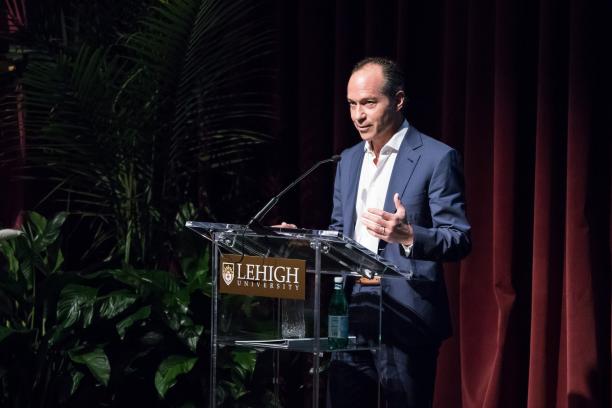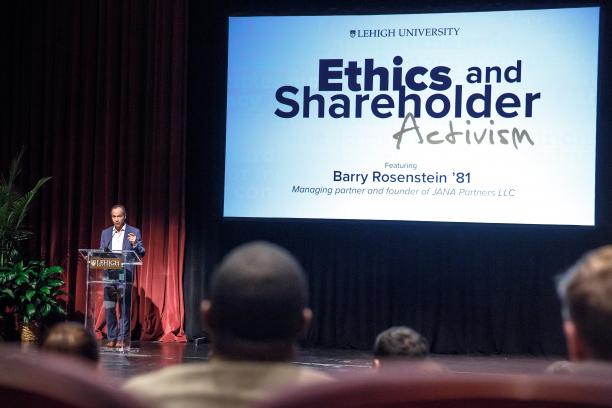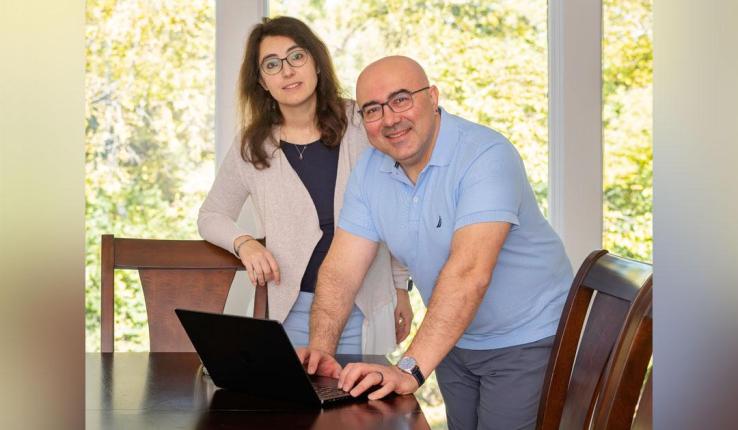Barry Rosenstein ’81 Presents Shareholder Activism and Ethics
“Anyone can learn to practice ethical decision making. It is never too late to start,” said Barry Rosenstein ’81 during the “Ethics and Shareholder Activism” presentation in Baker Hall on November 7. Rosenstein spoke to more than 250 students, alumni, faculty, and staff members as part of the Speaker Series on Ethics.
As managing partner and founder of JANA Partners LLC, Rosenstein has extensive experience in ethically navigating within the business community. JANA is a value-oriented, event-driven manager that invests in companies undergoing or expected to undergo change. Rosenstein and his team practice a principled shareholder activism process to improve a public company overall through investment, increasing the value of the company stock price, and, ultimately, improving the company’s operational performance.
“Activism is like most other professions, except perhaps reality TV, in that you can make it ethical,” he remarked. “That is why I, my partners, and my team try to do it every day.”
During his presentation, Rosenstein focused on key points that shareholder activists need to follow when working with a company to accomplish goals. Develop trust in every relationship, always treat people with respect and kindness, and be fair in deal making — traits that can be applied to any setting in life. He said that “acts of genuine human decency” separate professionals in the trade.
“Who we are and how we comport ourselves defines us,” he stated.
Rosenstein explained that, in the past, top company leadership was resistant to shareholder activism because of the nature of the process. But now, shareholder activists are often welcomed by CEOs who are open to ideas and are willing to implement them to make change.
In attendance at Rosenstein’s presentation was President John Simon ’19P, who commented, “I think it’s important for everyone to develop their moral compass by hearing alumni leaders from various professions share how they think about practicing ethics in their fields.”
Provost and Vice President for Academic Affairs Patrick Farrell introduced Rosenstein and said how proud Lehigh was to welcome Rosenstein back to campus to speak to students on such an important topic.
“At Lehigh, we prepare students for success, and what better preparation than to engage with successful alumni,” he commented.
Rosenstein included that the past does not dictate the present, and anyone is capable of developing their sense of ethics and making honorable choices. He wished the students “a successful and ethical career.”
During the Q&A session, finance major Brian Duddy ’17 asked how young employees should handle the situation of being asked by their bosses to do something they consider unethical. Rosenstein’s response was an unequivocal, “don’t do it.”
He added, “I was around in the 80s — I had friends go to prison for things they had been instructed to do but they thought was immoral.” His advice was to “find a new job.”
Another attendee asked Rosenstein what he valued most about his Lehigh experience. He replied, “The rigor — I worked a lot more here than I did at Wharton.”
A certified public accountant, Rosenstein earned his Lehigh University bachelor of science degree in accounting with honors. He earned his M.B.A. degree from the University of Pennsylvania’s Wharton School of Business in 1984.
The Significance of Imbedding Ethical Thinking
The Speaker Series on Ethics is made possible by the Endowed Fund for the Teaching of Ethical Decision Making. The fund was established by members of the Class of 1961 for their 50th reunion fund campaign. Since its inception, the speaker series has brought 16 leading ethics educators to speak to the campus community. Topics have included global business ethics, protection of personal privacy, and the biotechnological restructuring of life.
Mike Hoben ’61, instrumental in creating the fund, said creating the Speaker Series on Ethics was crucial, because ethics aren’t a factor most students consider while planning their future careers, despite ethics being what Hoben considers “a guide to someone’s life.”
Hoben added, “Thinking about ethical implications might obviate a bad outcome. You don’t have to look very far to see the lapses.”
Professor Nandu Nayar, Hans J. Baer Chair in International Finance and chair of the Perella Department of Finance, said that the opportunities the Speaker Series on Ethics provide are fundamental to students’ full understanding of finance and preparation for entering the workforce.
“It exposes students to the real-world implications of ethical behavior, which is really critical,” said Nayar.
Story by Kelsey Leck ’16 ’17G and Dawn Thren
Photos by John Kish IV
Posted on:






